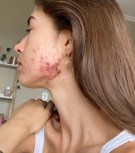HEALTH
Your Bod
Your Top 10 Body Questions …Answered!

You’re going through puberty (duh), and you have questions (who doesn’t?). The only problem? You’re afraid to ask! No worries—we took your most baffling body Q’s to the experts for you.
You’ve got things on your mind. Private things. While your hormones are having a wild party inside your bod, your brain is racing with questions about what’s really up with what’s going on down below. So where do you find decent answers about those puzzling body bafflers? Right here! GL editors took your letters to the experts. Keep reading for the answers to your most intimate inquiries.
Sometimes I have white stuff in my underwear, sometimes clear stuff. Can you clue me in?
Your vagina becomes an effective self-cleaning machine during puberty…and stays that way. That’s why, around 11 or 12, you notice more discharge. What is it? Your privates are simply expelling a mixture of mucus, bacteria and used-up vaginal cells to keep things normal, explains Dr. Charles Wibbelsman, author of The Teenage Body Book. “It’s normal to have a clear, whitish, non-irritating discharge,” he says. So…you get a clean bill of health.
Still, according to stats from the Vagisil Women’s Health Center, 16 percent of chicas don’t know some discharge is normal. To get even more in depth, if you’ve already started menstruating, the stuff is usually kinda clear during the first half of your cycle (those first 13 or so days after you start bleeding). Around days 14 and 15, the vaginal liquid gets whiter, kind of like skim milk, when your ovary releases an egg. That’s ovulation, which prepares your body to have a baby, which, of course, you’re not ready for yet. If you don’t have your period yet, the discharge is similar—you just won’t see quite as much of it.
You’ve asked an amazingly important question, because if you notice discharge changes, that’s your sign that something could be a teensy bit off. If the liquid is yellowish, gray-white or fishy-smelling, you could have a bacterial infection. If you have an odorless, thicker-than-usual, cottage cheese-like discharge, you might have a yeast infection (on to the next question). Either way, your doctor can give you a prescription that will bring things back to normal.
This might sound stupid, but what’s a yeast infection? I know you treat it with a cream or pill. Won’t it go away if you just leave it be?
This kind of yeast has nothing to do with baking bread. Sorry, bad joke. Yeast are organisms that live naturally in the vagina. When too many take over, a girl winds up with an infection. This can happen when you take antibiotics or wear wet clothing too long or for no reason at all. Half of all girls will have had a yeast infection by age 25, and 75 percent of all women will have at least one during their lifetimes.
So these infections are quite common. It’s not serious but, without medication, could be a problem for weeks. Yeast infections aren’t hard to detect. Your vagina gets real itchy, you’ll notice a thick, white discharge, and it might burn when you pee. But it’s not a good idea to run out and buy over-the-counter yeast infection medicine if you’ve never had one before, explains Dr. Cathryn Tobin, a pediatrician in Ontario. You could have a different infection, such as bacterial vaginosis (the most common vaginal infection). Only a doctor can give you the right diagnosis—and the right medicine.
I’ve started my period, but I am still totally flat-chested! What gives?
Hey, what do you have against being flat? Someone in your family likely has genetically passed down her small chest—maybe your mom, dad’s mom or great aunt. So even though you’re going through puberty (getting your period is a sure sign that things are moving along), your boobs probably just aren’t built to burst out of your tank tops.
There’s still hope, of course. Your breasts should continue developing until you’re at least 18, says Dr. Adelaide Nardone, gynecologist and medical advisor to the Vagisil Women’s Health Center. You might also see an increase in chest size if you gain weight. For now, be patient. No pill or exercise will do the trick. Besides, you’re beautiful as is. If you still feel self-conscious about your grapes not looking like melons, try a padded bra.
I’m 12 and pudgy. How do I tell the difference between baby fat and just plain fat?
There’s no more baby fat by 11 or 12, explains Martica Heaner, exercise physiologist and co-author of Cross-Training for Dummies. But a little pudge isn’t bad! Body fat is nature’s way of storing food and energy. And everybody carries fat deposits differently. You can have a tire around your belly even if you do a million sit-ups. So don’t be so hard on yourself. Just get 30 to 60 minutes of exercise four to five times a week. This can include walking to school, soccer practice, jumping jacks or playing with the dog. Your heart should reach 200 beats a minute during vigorous exercise, explains Phil Lawler, a phys ed teacher at Madison Junior High School near Chicago. Ask your gym teacher to test you.
Also, eat healthfully. You know the food pyramid? It wants you to eat whole grains; lots of fruits, vegetables and beans; dairy stuff; small amounts of meats or proteins; and a tiny bit of saturated fat. If you eat three normal-sized (not super-sized) meals a day and do some activity, you should feel great about your physique. OK, dropping the Doritos and remote is a problem for almost everyone. But slightly overweight people are often healthier than too-skinny ones. Overly thin girls don’t get the nutrients they need to build strong bones.
When I wear pads, I swear people can smell them. Am I imagining things?
Yes! Lots of us worry about smelling funky—and rarely does anyone else notice. Stay fresh “down there” by following fool-proof guidelines for maxi-pad use. First off, change the thing every four hours, explains Dr. Nardone. “As blood dries, it smells,” she says. Bacteria get into the pad, and the blood begins to decompose (hold your nose) and, well, we’ll spare you the rest. This is a normal, natural process. But to keep odor-free, put on a fresh pad when you see a lot of blood on it, even if it’s only been an hour or two.
To fight odors, you can try deodorant maxis, Dr. Nardone says, but many girls are sensitive to the perfumes and should stick to unscented. Also, shower daily—with or without a mild soap—for good vaginal hygiene. If something still doesn’t smell right, see a doc. You could have an infection that needs an easy (we promise) prescription treatment.
How do I tell my mom I want to use tampons instead of pads?
No need to be embarrassed. Your mom has probably been using tampons for decades, so this stuff is like talking about the weather. She’ll appreciate that you came to her for advice, says Dr. Gilda Carle, psychologist and author of The Teen Guide to Dating. “She wants you to feel good about yourself, so she’ll try to help you,” Dr. Carle says.
Don’t worry about the myths you’ve heard about tampons—they don’t mean you’re sexually active in any way. To make it easier, tell your mom, “I read that a doctor says tampons are a nice option for girls who are active or don’t want to wear bulky pads.” Then add, “I also heard some are made especially for young teens. Could we buy them next time we’re at the store together?” Take a deep breath, and try to be comfortable. It’s worth it—tampons are convenient and can make life less messy when you want to go swimming!
I can’t insert a tampon without it hurting. Is something wrong? How do I get it in right?
Tampons can be tricky at first, but they shouldn’t be uncomfortable or painful at all, insists Dr. Wibbelsman. You probably need to learn precisely how to put them in place. Start by buying the slender regular sizes (they are the smallest and easiest to insert).
Now, follow these steps. 1) Sit on the toilet, or stand in front of it with one foot on the floor and one on the toilet seat. 2) Toss the wrapper (duh!), and put the rounded tip against your vaginal opening. With your forefinger on the plunger (the end pointing downward) and your middle finger and thumb on the upper part of the applicator, gently push the tampon inside your body, aiming toward the small of your back. Once you’ve pushed the inner tube all the way into the outer tube—this pushes the cottony absorbent part into the perfect spot—withdraw both tubes, leaving the string hanging outside your body.
A few more tips: It’s easiest to insert a tampon when your flow is heaviest, like the first three days of your period, because you’re more lubricated. You may want to use pads on lighter days. Or try an over-the-counter vaginal lubricant—K-Y Jelly is a brand doctors recommend—on the end of the tampon before insertion. This is a safe way to make the whole process slicker. Once you’ve got it in right, you shouldn’t feel a thing!
Hair recently appeared on my upper lip. It’s ugly. Why is it there, and what should I do?
If you have hairs on your privates, fuzz on your upper lip can be part of the deal. As annoying as it is, many females battle the chick’s mustache. If you have dark, thick hair on your head, your lip hair may be darker. If you’re a blondie or have fine hair, it should be less of a nuisance.
You have options. You can use a depilatory cream like Nair (works well but might leave a rash), pluck (ouch, ouch, ouch), or bleach with a kit like Jolen’s (can be irritating and doesn’t get rid of fuzz). Another line of attack is to get waxed—but home kits like Sally Hansen’s are tricky, and visits to the salon can be costly ($10 to $25 a pop). Waxing works, but it hurts. A new chic technique called threading (a cosmetologist pulls out a row of hair by twisting it between cotton threads) costs about the same as waxing. A dermatologist can prescribe Vaniqa to thwart growth, but it doesn’t work for everyone, explains Dr. Michael Tomeo, chairman of dermatology at Philadelphia’s Holy Redeemer Hospital. Each technique mentioned has to be repeated every few weeks…forever. Talk to a beauty guru about what’s best for you. Heck, you might decide to live with the fuzz because the fuss isn’t worth it. That’s what a lot of us do.
Why do so many people make fun of masturbation—or make it seem like a bad thing? I can’t even ask anyone because it’s so embarrassing.
Sex. There, we said it. Because it’s personal and private, sexuality makes many people feel funny. It’s often easier to avoid the subject—or make fun of it. Your budding sexuality (thanks to puberty), including masturbation, is completely normal, explains Dr. Rachel Rosen, a Buckingham, Pa., physician. Absolutely everyone gets new urges and feelings around age 11 and up. For example, raging hormones might make you think about boys in a way you didn’t before.
But just because something is embarrassing doesn’t mean it’s bad. “It’s natural to be curious about your body,” Dr. Rosen says. “Masturbation is safe and healthy—and you should decide whether you want to explore or not.” Of course, this doesn’t mean you want to discuss your feelings with the universe. But, privately, masturbation is nothing to be embarrassed about.
Why do I get little zits between my thighs? They are so ugly and embarrassing!
Ugh. Join the crowd. Up to 25 percent of dermatology patients have folliculitis, in which the hair follicles on your thighs (and other parts of your bod) get infected and zit-like. Usually, friction from skin rubbing and sweating sets off the problem. Other triggers, explains Dr. Jeanine Downie, director of Image Dermatology in Montclair, N.J., and author of Beautiful Skin of Color, include acne-causing hormonal changes, irritating lotions or creams, shaving, and genetics. Gently wash the area with a washcloth and oil-free soap, like Neutrogena Body Wash, to exfoliate. If that doesn’t clear it up, see a dermatologist. She’ll give you a topical prescription to make your thighs smooth as a baby’s bald head.
—Kristen Kemp
We want to hear from you! Send us your weirdest body questions here (seriously, we'll answer anything!) and it just might get featured.

 become a contributor
become a contributor


















